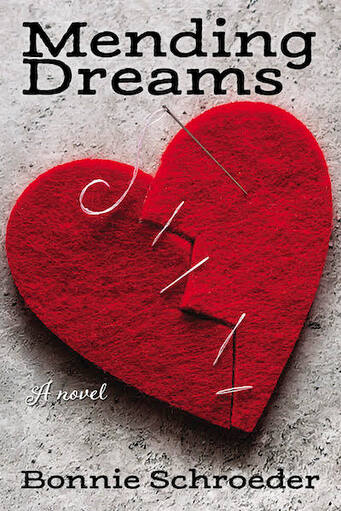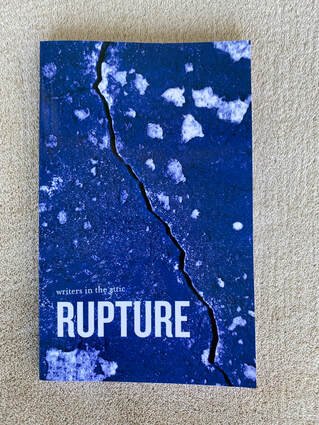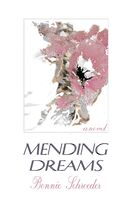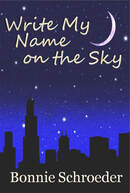|
Reposted from "The Writers in Residence" on June 8, 2022 Unlike many of my colleagues, including several Writers in Residence, I’m a novice at self-publishing. My first two novels were published by the late, great Champlain Avenue Books (CAB), but they’ve closed up shop—which means those books are no longer available, not online, not in bookstores, not anywhere except in the boxes stashed in my linen closet.  It has therefore fallen to me to get those books back out into the world for people to find and—I hope—buy or at least read. As I embarked on this journey, the best advice I received is this: “get professional help,” and they didn’t mean psychotherapy (although that may be necessary on down the road.) I took that advice and enlisted the wonderful Paula Johnson to guide me, answer questions, tolerate my whining—oh, and design the cover and format the manuscript for uploading to print and e-book formats. Thanks to Paula’s hard work (and a little of my own), it looks as if Mending Dreams, my very first published novel, will be resurrected later this month, first as an e-book and eventually in print as well. Even with a pro steering me through this, I’ve had to manage some issues myself and make a few decisions. CAB really spoiled me—all I had to do was write the book and turn it over to them. But now … First came the cover image. Paula sent me ideas for a basic concept, and I found an image I liked, which Paula then massaged and added the text. Here it is. Yep, it’s a radical departure from the First Edition cover, and I confess that neither Paula nor I loved-loved-loved the image itself. However, it does speak to the heart (pun intended) of the story, it’s eye-catching, and it will tell the potential reader/buyer what kind of story this is. This is an important consideration when choosing a book cover, as Miko Johnston observed in her recent post here. Once the cover was set, and before we could proceed with formatting the manuscript, I had to manage those business issues. Fortunately, the copyright I registered for the first edition still applies, but I had to procure new ISBN numbers for both formats, plus an LCCN number. Those initials, as you probably know, stand for International Standard Book Number and Library of Congress Control Number respectively. The former is your book’s unique identifier, which you can purchase from Bowker. Some self-publishing platforms will offer to provide them for free (they’re not cheap!), but I wanted my own so I could take it with me to other platforms in the future if I wanted. And you don’t absolutely-positively need one for an e-book, but I went that route because I’m just a total control freak. The LCCN number tells libraries or any other interested party specifically where your book is located within the hallowed halls of the Library of Congress. Registration is free, although the website isn’t the most user-friendly, but they were quick to give me a provisional number, which will become official only when I send them a copy of the published print book. An LCCN number is not mandatory, but if ever I hope to get my book into libraries, I need one. Paula did a fine job formatting both the print manuscript and the e-book, which I then had to read over for any weird section or line breaks and other things like that. In theory I only needed to scan the files because the text itself was straight from my triple-proofread manuscript, but that process wasn’t as easy as I expected. This was mostly because I got caught up in reading the text, and there were times when I came on sections where I went, “Wow, I don’t remember writing that!” In the end, I found very little to correct. I learned a couple of new terms during this process: “Front Matter” and “Back Matter.” They are just what they sound like. Front Matter comprises the title page and the copyright page, where those pesky numbers are shown, along with the usual copyright notice and typically a disclaimer about this book being a work of fiction, etc., plus any credits or dedication you want to include. Back matter is where you place any Acknowledgements and the author bio. And here’s where professional help’s value is evident. Paula suggested I include some book club-type questions AND an excerpt from Write My Name on the Sky, my second novel. She also included my website url and a request for reviews at the end of the bio. These are things that would never have occurred to me. The final touch is the back cover, where I put a short summary of the story that, with any luck, will entice a prospective reader to open the book and read more. It helps to have one or two “blurbs” by published authors, praising my book, and my good friend G.B. Pool stepped up and wrote a lovely blurb for the back cover of Mending Dreams. “You gotta have friends.” So true! I’m still traveling along that learning curve. Next stop: distribution—how to get the book into readers’ hands. There’s a dizzying array of options, and I think I’ve narrowed the choices down. But that’s another story, for another day. The bottom line is this: yes, it’s a lot of work to publish your own books. It’s scary and sometimes confusing. But for a control freak like me, it’s also exhilarating. And I want to emphasize that the path I’ve chosen is not for everyone. Many of my colleagues have gone the self-publishing route totally on their own, with great success. Several of them have shared their experiences, as well as tips for my own adventure—along with support and encouragement. However, such skills as I have are verbal, not visual. For a novice self-publisher like me, having a partner has made the journey less confusing, and I know the end result will prove I made the right choices. Good luck on your own publishing journey, however you go about it, and thanks for reading.
1 Comment
Reposted from "The Writers in Residence"  The last time I posted here, I was in the throes of a move to Boise, Idaho. My third novel was almost finished, although another couple of rounds of editing would take place before I considered it ready for publication. In the meantime, Champlain Avenue Books—publisher of my first two novels, Mending Dreams and Write My Name on the Sky—decided not to issue any new work, and at present they are closing their doors entirely. Therefore, I can’t announce that my latest novel, working title Turn Back the Clocks, is being published, but I’m actively seeking a publisher, so stay tuned. Meanwhile, I’ve been writing short stories. And one of them, I was delighted to learn, was accepted for inclusion in an anthology published by The Cabin, a local literary arts organization in Boise. Idaho has a lot of writers, and a lot of readers—there’s not a lot else to do in the winter here, you know. And The Cabin has a lot of prestige within the community—I can now say my work has been included in the same book as a former Poet Laureate of Boise. The Cabin chooses a theme for each year’s anthology, and this year’s theme was “Rupture”—kind of fitting, given the state of the world these days. When I saw the theme, guess what came to my mind? Were any of you in Southern California on January 17, 1994? If you were, you probably remember the Northridge Earthquake. That was the only time in my life I truly thought I was going to die—waking up in the dark with the whole house creaking and groaning and the sound of glass shattering. So, I decided to write a short story about the Northridge Quake. Now, I had a 1500-word limit, and it was hard to capture the magnitude—pun intended—of that event, so I chose to describe just a few minutes in the life of one person—Amy—who awakes, as I did, at 4:30 in the morning to the sound of her world crashing apart. She’s alone—her partner or husband, we don’t know which—has left, we don’t know why. And I needed to show what kind of person Amy is, without going into a lot of description. Well, actions speak louder than words, so I used a device which won’t surprise anyone who knows me well. Amy has a dog, and her overriding concern is, where’s the dog? She gets up, finds the dog—who is of course terrified and cowering in a corner—and tries to calm the traumatized animal. And in doing that, she kind of calms herself. She cleans up the glass from the kitchen floor so the dog, Luna, won’t shred her pads, feeds Luna, and waits out the aftershocks—there were more than a thousand in the aftermath. The story ends with Amy and her dog sitting together in the dark, waiting for daylight, and although it’s not stated explicitly, you get a sense that they will both be okay. (I’ll explain in a minute why I’m telling you the whole story instead of suggesting you buy the book.) So I sent the story off, and a few months later I was thrilled to get an email from The Cabin, saying they’d chosen my story, which I called “Fault Lines,” to be included in this year’s anthology, titled “Rupture.” The email also informed me that they’d received 293 entries, and out of those had selected just 50. So I felt pretty good about that. Unfortunately (or perhaps not so unfortunately), The Cabin is largely staffed by volunteers, and as a nonprofit it runs on a very small budget—which is why “Rupture” won’t be widely distributed. You won’t be able to search for it on Amazon. Eventually—and it hasn’t happened yet, but it will—”Rupture” will be featured on their website and will be available for purchase, but don’t hold your breath. And there’s no free shipping either! I hope to eventually be able to post a PDF of the story on my website; I did retain all rights. Since I did have some success entering this story in . . . well, it’s not exactly a contest, as there were no cash prizes, but I was competing against a field of other writers—I thought I’d discuss the value of entering writing contests, especially short story contests. It’s a good way to gain visibility for your writing, and sometimes you even get paid. I’ve lost count of the number of contests I’ve entered, and most of the time I don’t win, but I have had enough small successes to keep me encouraged. And sometimes, if you win a contest, it boosts your chances of selling that story somewhere else. That happened to me the year after I moved to Idaho, when I entered the Idaho Writers Guild’s short story contest. A story that had been rejected by several literary magazines actually won first place! Not only did I get a cash prize and a nice certificate, I went on to sell that story to “The Bark” magazine—it was a story about a dog, of course—and “The Bark” paid me even more money! Now, how do you find contests, and how do you know which ones to enter? There is usually a fee, mostly around $25-$50, so you don’t want to go entering them willy-nilly unless you have a lot of cash to spare. “Poets & Writers” Magazine has a bi-monthly list of writing contests, and so do other writer-centric publications and websites. If you see one that interests you, before you submit, go to the contest’s website. It’s usually a literary magazine or website that publishes other stories and runs a contest a couple of times a year. They often post previous winners, so take a look and see if the winners are anything like what you’re writing—not so much the storyline, but the styles and themes you see. If you want to send in a literary piece and all you see among the winners are slasher stories or aliens from space—probably not the kind of contest you’d be likely to win. Also, try to find out who’s judging the contest. Sometimes it’s just “the editors,” but occasionally they’ll publish the judge’s name, maybe even a little bio. Check that out and see if you get a sense of the judge’s taste. Not always possible, but if you can do it, and if the judge’s taste aligns with yours, you have a better chance of winning. I actually did this with the Cabin’s anthology. I submitted a story two years ago for their anthology that was themed “Fuel,” and it wasn’t accepted. I knew nothing about that judge, but I did hear him speak at a conference after I’d entered the contest, and I knew just from listening to him that I probably was out of luck, and sure enough, my story wasn’t accepted that time. However, this year’s judge was someone with whom I was familiar. I didn’t know him personally, but I’d seen him talk about the winners of another contest he’d judged, and I really liked the way he talked about the work and what he appreciated about it. I figured I maybe stood a chance this time, and sure enough, I was right. There are nonfiction contests, and poetry contests, as well as fiction contests. So go and explore the landscape. Target a few possibilities and risk the investment—it may well pay off, not only in monetary rewards, but also in status, and maybe even publication. Good luck! I was on an author panel recently, and a member of the audience asked us if we wrote every day. The other panelists confirmed that they did, and I had to confess that I do not. I know, call me Slacker.
It’s not like I don’t enjoy writing—most of the time. I usually have plenty of ideas of what to write, I know where my work in progress is heading, and I WANT to sit down and write, but there are days when it just doesn’t happen. The phone rings—Caller ID tells me it’s a friend I haven’t heard from in weeks, so of course I must answer. Or the computer goes on the fritz and I spend an hour in Help Desk Hell, listening to a robovoice assure me that my call is very important, so please stay on the line for the next available representative. Or the dog begs me for a walk with an irresistible, pleading expression on her furry face. And there go my good intentions right out the window. Generally, I make up for lost time, sooner or later. I turn off the phone, let the dog amuse herself in the yard for a while, and swear off Facebook until I’ve done at least 1000 words or put in an hour of writing, whichever comes first. Recently, however, everything ground to a screeching halt—not for a day, or even a week. For a month. I had a good excuse: hip surgery. The surgery itself was uncomplicated and successful, and I’m making a rapid recovery. But in the days leading up to it, I had too many things to think about besides my current work in progress, where I was a little over the halfway point. Post-surgery, there were many more distractions: follow-up doctor appointments, physical therapy, and fatigue that demanded frequent naps. Additionally, for a while I needed heavy-duty prescription pain meds—a creativity-killer if ever there was one. The opioid fog began to clear, but I still felt apathetic about writing. I’d abandoned the unfinished novel at a point where I wasn’t sure exactly what should happen next, which was a huge tactical error, but by then it was too late to remedy it. I stared at the pile of pages on my writing table, overwhelmed with hopelessness. The novel reminded me of a car with a dead battery; the parts were all there, but the battery was drained and the vehicle was just a cold, unresponsive lump of metal—or, in this case, paper. At that point, I gave in to despair. Why bother? Who cares? Does the world even need another book from me? Then I remembered that some people did care: my writers’ critique group. I soon would owe them 30 pages of new work. With that deadline looming, I sighed. How could I let them down? I must at least try to produce something for them. So I picked up the pages and re-read what I’d written before I went under the knife, all the while laughing at my foolish assumption that I would “catch up on my writing” while I was recuperating. The pages I’d already written weren’t bad, and I’d gotten some positive feedback from my fellow writers. I started writing down words, reminding myself that if I simply put them on paper, I’d have something to work on, something to build on and edit. I remembered a valuable saying: You can’t fix what’s not on the page. I knew this approach as surely as I knew my own name, so I gritted my teeth and ground out five pages. They seemed flat and pointless. But at least I had something to show for my time and effort. And as I read over what I’d written, I had an idea for how to make them better. A flicker of hope beckoned. Hey, maybe this wasn’t a lost cause. I wrote a few additional pages, and the more I wrote, the more ideas started to flow. First a trickle, then a stream. I lost track of time as I scribbled the outline of what needed to happen next, and a delicious enthusiasm flowed over me, that feeling I’d begun to fear was lost for good. That poor old dead engine had finally turned over. It sputtered a few times, but then it started chugging along. I still have a long way to go to “The End,” but if I hadn’t sat down and made myself pretend to be a writer again, the muse would not have whispered in my ear. Why try and talk to someone who’s not listening? So you see, magic can still happen. Believe in it. You may think the game is lost, but there’s always the chance it isn’t over yet. There may be a tiny spark of life left in that engine after all, but you won’t know unless you fiddle around with it a while. Anybody out there who had to abandon a project and then fought to resurrect it after some time had passed? How did you get going again, or did you? Or perhaps now you’re thinking, maybe you will…? |
About my blog
This blog features new entries plus "encore" presentations of guest posts from years past. Categories
|


 RSS Feed
RSS Feed
